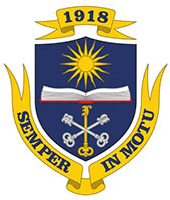Sergey Bykovsky, a postgraduate student from the Faculty of Biomedical Sciences founded an insectarium in Voronezh in 2019. In a few years, a small room turned into a real insect centre in the city. Now, this is a place where you can attend lectures for children and adults, go on a guided tour and get answers to any questions regarding invertebrates.
Sergey has been enraptured by insects since early childhood. Then he had two hobbies: insects and dinosaurs. The interest in dinosaurs quickly passed: as Sergei says, you can't see them “live”. But the interest in insects has remained.
“At school I took up collecting insects. I collected beetles, dragonflies, and grasshoppers. I wanted to join an entomology club, but there were none in the city. Eventually, I came to VSU, to the Department of Ecology and Systematics of Invertebrates. Since the ninth grade I would come to the university, would visit sessions of practical training. And when it came time to submit my documents, I had no doubts about where to go. I had no other option but the Faculty of Biomedical Sciences. And so it happened: I entered the faculty.”
If you deal with insects you have to keep collections: “catch-kill-define”. But Sergey is not interested in working with dead insects: “you can't learn about their lives”.
“That’s why I took photos of all creatures that lived at my place. I made notes about their behaviour, about what they ate, how they built relationships... I remember one day I came home from the university, and my mother asked me to give a tour to a friend of hers around my room. And that is when I realised that there were so many insects in my house that either you had to sit on the couch and watch them or there was no place even on the couch.”
Some friends of his suggested that Sergey made an exhibition and raised money for it by crowdfunding. That is how “Insectarium” came to be. At first, there were a couple hundred insects in the insectarium. Today, there are a couple thousand of them.
“Most species I keep as pets but there are other people who keep some and we can swap them. For example, if I bred too many cockroaches I would swap them for grasshoppers. If there were too many bird spiders, I would sell them and buy some bugs. You can handle dead insects in a similar way. This is dry material that can be added to a collection, sold, or exchanged.”
Sergey is planning to breed feeder insects that can be fed to lizards, bats, and birds. The entomologist also wants to create a laboratory to breed rare specimens, for example, peppermint stick insects, which are the most favourite “pets” for the postgraduate student from the Faculty of Biomedical Sciences.
According to Sergey Bykovsky, human lives also depend on insects. For example, if there were no grave diggers, corpses of animals will be strewn everywhere.
“Most fruits and vegetables that we eat every day have appeared thanks to the fact that a bug transferred pollen from one plant to another. As long as insects do their work, we don’t notice or appreciate this. As soon as insects disappear, problems start to arise.”
Today, “Insectarium” lives on lectures, film showings, guided tours, and field trips. You can help the insect centre by transferring money to the Sberbank card (5469 9804 7264 4877). But as Sergey Bykovsky says, “a better option is to visit the centre, to bring friends, and tell others about the interesting place that you have been to”.
Photo: Dmitry Chernov, Sergey Bykovsky












